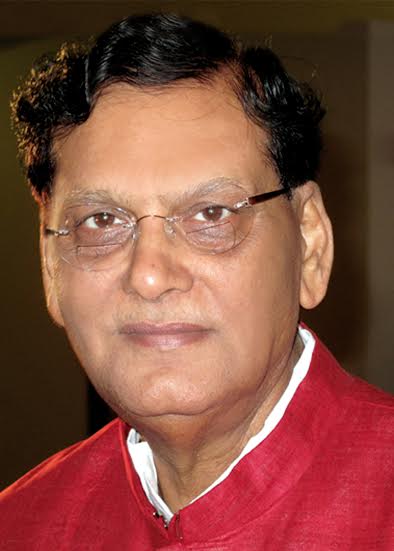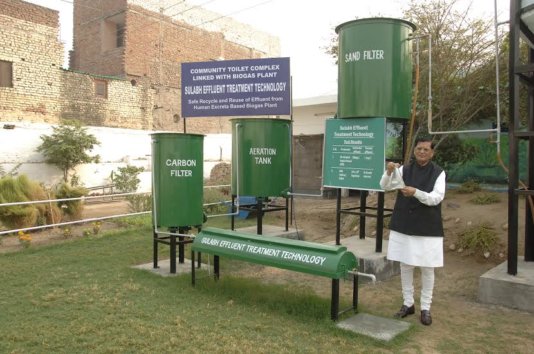- About
- Topics
- Picks
- Audio
- Story
- In-Depth
- Opinion
- News
- Donate
-
Signup for our newsletterOur Editors' Best Picks.Send
Read, Debate: Engage.
| March 30, 2016 | |
|---|---|
| topic: | Discrimination |
| tags: | #caste-system, #Ghandi, #India, #Sulabh International Social Service Organisation (SISSO), #untouchables |
| located: | India |
| by: | Jose Kalathil |
Dr. Pathak has been honoured with several awards - national and international - for his outstanding work in the arena of environmental sanitation and social reform. Some of them are Padma Bhushan from the Government of India (1991), the International Saint Francis Prize for the Environment (1992) and the Stockholm Water Prize (2009). In a candid interview with FairPlanet, this 'Messiah of Scavengers' talks about the foundation of Sulabh, its success so far and his dreams for the future.
FairPlanet: It has been more than four decades since you founded the Sulabh International. Would you please tell us how it happened?
Dr. Pathak: Once, at home, as a child, I had playfully touched an 'untouchable' woman. To atone my ‘sin’, my devout grandmother force-fed me a 'purifying mixture' of the holy Ganga water, cow dung and sand. Later, to study and acquaint with the problems of untouchables known as scavengers, I stayed in their colony in Bettiah in the state of Bihar for three months, where I was shocked to see a newly-married woman coerced by her in-laws to manually clean toilets. There, I also saw a boy being gored to death by a bull in front of many onlookers. Nobody dared to rescue him or take him to a hospital since he belonged to a scavenger family, and so he was 'untouchable'. These events haunted me a lot. I was also reminded of my mother's advice: "Son, in your life, if you can save or better someone's life, your birth as a human-being is not without worth and can be called a success." All these things made a deep impression in me and finally deciding to start Sulabh.
What are Sulabh's major activities?
Started with seven volunteers for the rehabilitation of the lowest caste of society, Sulabh now has a work force of 50,000. Sulabh works hard to fulfill the dreams of the Father of the Nation, Mahatma Gandhi, for the day when there won't be any 'untouchable', whom he called Harijans (the children of God). Sulabh works for their rehabilitation, who are now called Dalits.
Are you satisfied with the work done so far?
We have achieved many things and are striving to accomplish more. Many things still remain to be done. The 1961 census showed manual scavenging had existed in 3.6 million homes and 800,000 people were engaged in it. The latest Socio Economic and Caste Census (SECC) data says it still exists in 200,000 houses. Tamil Nadu and Andhra states are free from scavenging. UNDP Human Development Report 2006 says, worldwide, there are 2.5 billion people without proper sanitation facilities. In India, Prohibition of Employment as Manual Scavengers and their Rehabilitation Act was promulgated in 2013. Thus, the government is also working to eradicate this inhuman practice.
What is your immediate and major objective?
I would like to contribute our mite to fulfill Prime Minister Narendra Modi’s plan of building toilets for all by 2019. But it can be fulfilled only if toilets are built on a massive scale with our low-cost technology. In India, 1.76 million houses still don't have toilets. We need Rs 3,600,000 million ($52,941 million) for building toilets in these houses in three years.
I plan to seek funds from the government first. If I fail, I will approach the 3,825 billionaires in the world. There are 16,057 Indian companies that earn profit of more than Rs 50 million ($735,294). There are nearly 20 million NRIs, and if each of them contributes to building six toilets over a span of three years, then this target can easily be met. We will approach them to seek financial support so that every household in India has a proper toilet.
Sulabh also works for their social acceptance through measures like ensuring their entry into temples. Sulabh hopes that a day will come when Brahmins and other upper-caste people eat together with these people, which Gandhiji wanted. Indians were ready to face the British bullets on Gandhi’s call, but were not ready to socially accept and eat with untouchables, as Gandhi wanted. Sulabh wants to change all this and we struggle to integrate the scavengers in the social mainstream.
Sulabh recently founded Nai Disha (New Direction) for the rehabilitation of scavengers in Alwar in the state of Rajasthan. This centre trains 100 women in food processing, tailoring, embroidery, beauty care, toy making, etc. Apart from the monthly stipend of about Rs 4,000 ($58.25) every trainee gets, they earn extra money by working at home. All of them have bank accounts as they are paid in cheques and some of them have learnt to speak English too. Their children now go to schools which was earlier not possible. People now address them with their proper names, instead of insulting them by calling them 'Bhangis' (scavengers) which was not unusual earlier. In 2008, 36 of the Sulabh-trained women even walked the ramp at the United Nations headquarters in New York in dresses embroidered by them along with famous models.
On the request of the state Scheduled Caste/Scheduled Tribe Finance Development Corporation and the Ministry of Social Justice and Empowerment, Alwar-based Nai Disha’s facilities for scavengers were extended to Tonk, the neighbouring district. Saris costing Rs 500 ($9) and more are made here on order. Started with 44 women, this centre now trains about 150 women in different vocational skills from 9 am to 4 pm every day. Their products are marketed by a non-governmental organisation, International Centre for Women and Child (ICWC). The things made here are sent to Bombay and Delhi, and some of them are even exported to the US and Europe.
Both Alwar and Tonk districts are now scavenging-free. Other centres where such facilities exist are Arrah in Bihar and Ghaziabad in UP.
The Sulabh movement has so far built 8,000 community toilet complexes in 26 states and four Union Territories. Two hundred of these complexes have human excreta-based bio-gas plants. These public toilets are used by over 1.5 crore people daily.
The 62-acre-wide Gandhi Maidan and the famous main Bailey Road in Patna, Bihar, were lighted with the bio-gas produced from the community toilets till 1990.
Sulabh has also built community toilets in Afghanistan and Bhutan. We have also trained people from 15 African countries like Ethiopia, Mozambique, Uganda, Cameroon and Burkina Faso, Kenya, Tanzania, Cote d’ Ivorie, Mali, Ghana, Rwanda, Senegal and Zambia etc. in health, hygiene and toilet building.
Sulabh's other works include rehabilitation of widows in the sacred cities of Vrindavan and Varanasi, where they come from all over India. It also runs a public school, where 60 per cent of students belong to the lower castes. Here, all students freely mix, eat and play together. They also clean toilets with their teachers, and keep their toilets spick and span.
The Sulabh Museum of Toilets exhibits toilet models from the Harappan civilisation to the latest technology. This museum has been visited by more than one million people that includes thousands of foreigners.
Above all, your most successful achievement has been the invention of a unique two-pit compost toilet technology, which is cost-effective, environmentally safe and can be easily made with locally available materials. It needs only 1.5 litres of water to flush. Each pit is designed for a three-year desludging interval, and the pits are used alternately. Bio-gas produced from the community toilet at Sulabh headquarters in Delhi is used for cooking in the community kitchen. So far, Sulabh has built 15 million such toilets in households and other organisations have constructed 54 million household toilets using the Sulabh technology. The Sulabh model has also been adopted by a number of countries, including China, Bhutan, Bangladesh, Afghanistan, Burkina Faso, Ghana, Kenya, Mali, Nigeria, Senegal, Tanzania and Zambia for expansion and promotion of sanitation facilities.
*Brahmins top the caste hierarchy in India.
*Scavengers traditionally clean and carry away human waste to eke out a living. The lowest in the caste hierarchy, they have been stigmatized as untouchables, and have no human rights, dignity and social status. They have been forced to live outside villages or cities in utterly unhygienic and poor conditions.


By copying the embed code below, you agree to adhere to our republishing guidelines.
